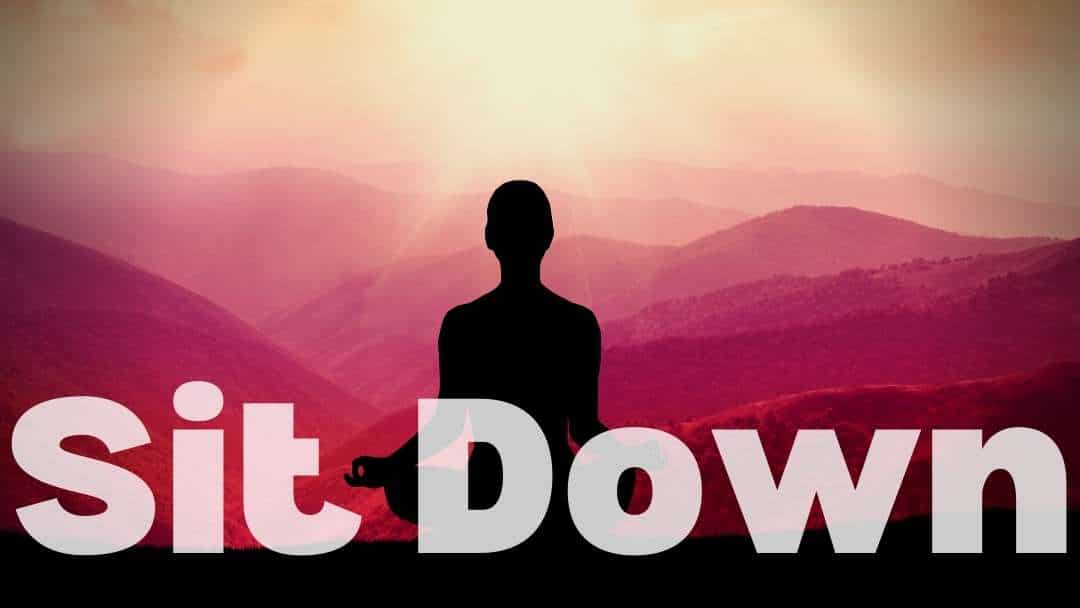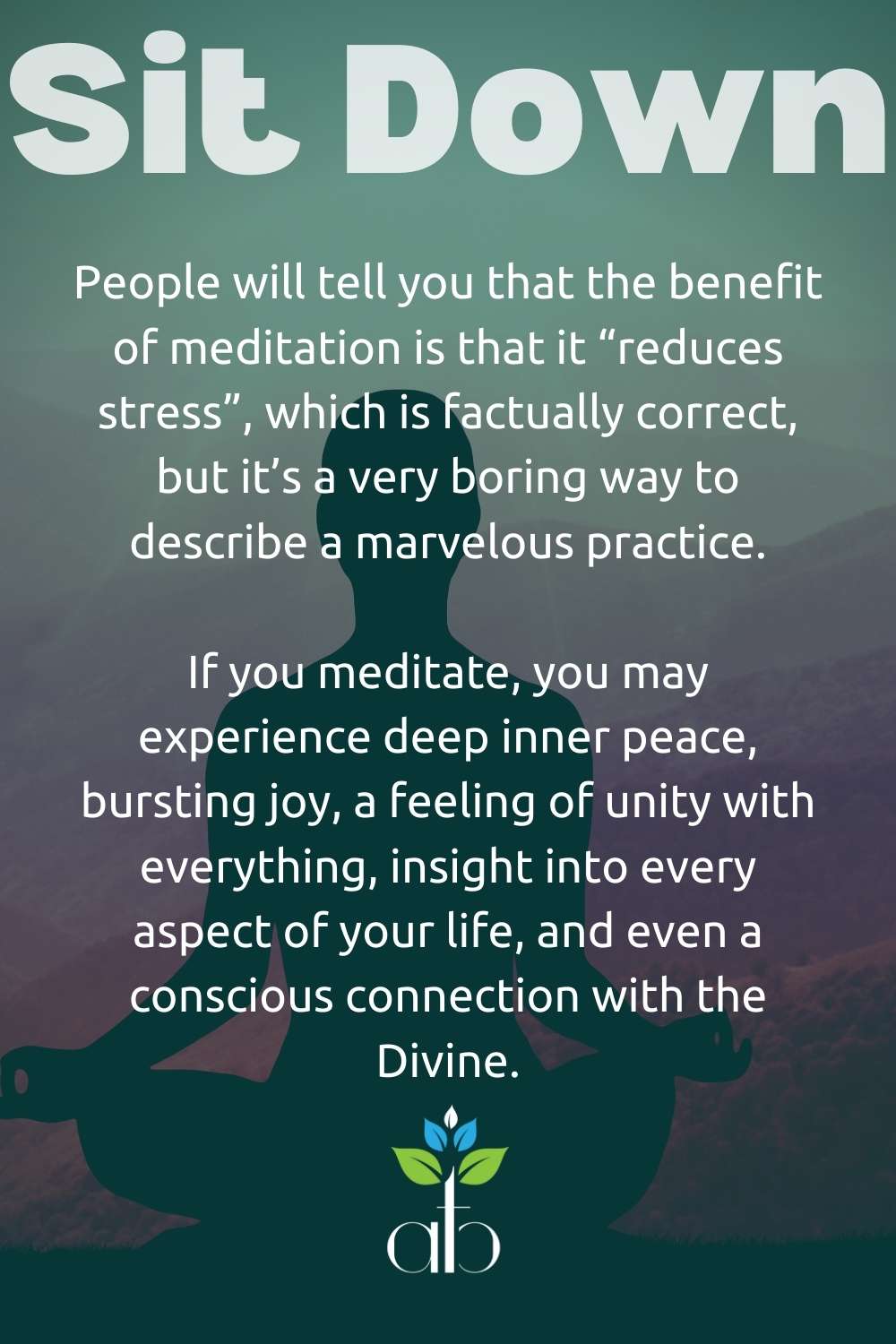Episode 71
Meditation for Beginners

When many people attempt meditation, they might sit for a few minutes, or even just a few seconds. Suddenly, they’re confronted with the inner workings of their own mind, which they might have tried to avoid for years or decades.
They jump up, startled, and run to do something that will distract from their own thoughts. “It’s just not for me,” they conclude.
What they might not realise is that almost every master meditator began the same way, with trepidation, impatience and uncertainty. And of course if you feel discomforted, alarmed, unsettled during meditation… That is the meditation. That is the practice.
Of course, perhaps people would be more determined to face those parts if they were aware of how much they had to gain. Many articles will tell you that meditation has benefits such as “reducing stress” and “lowers anxiety”.
It “reduces stress.” Great. It’s factually correct, but you may as well say that going to an art gallery or hiking in the mountains reduces stress. It does, but that is just one small aspect of the finest ways we can experience natural and human-made wonders.
As you move along in meditation, you might find self-love, faith, a connection to the Divine, the perception that there is no large difference between when “good” and “bad” things happen, happiness even in tough situations – or situations which you previously saw as tough.
Transcript
I want to talk to you about meditation for beginners.
And I was thinking about this in one of my friends or clients asked me, said she wanted to start meditation. She didn’t know exactly why because a lot of people had told her it might help her.
And she didn’t know how to do it and so I went through it with her, prepared all these notes to guide her through the process.
I’d like to share them with you so for me seated meditation is kind of the gold standard.
There are a lot of kinds of meditation. You can do a walking meditation and mindfulness mediation to be aware of what is going on around you. Feel the wind on your face and the seat under your butt.
There’s all kinds of things. When I say for me seated meditation is one of the easiest ways to begin.
When you’re walking around or doing the mindfulness mediation sometimes your mind can slip and you won’t even notice it.
You can fool yourself into thinking “Yeah, I’m a good meditator” but when you sit down and you basically are alone with your thoughts, there’s a lot less self deception going on.
That’s why I like it and think it’s a good way for a lot of people to start. It doesn’t have to be the only way, there’s many paths to success.
This is what I prefer to do, seated mediation. But the question, very important question: Why do meditation?
I was looking around for some articles to send to my friend and there’s this one from El Diario, a Spanish periodical, and its listing things like: greater capacity for memory, a greater capacity for learning, more empathy with other people, reduction of stress or risk of depression, increases capacity for attention and concentration.
All of these things are good and they’re actually kind of cool, especially the empathy with other people.
Actually this is pretty funny because a lot of these, half of them focus on things you don’t want. You don’t want stress, reduce your stress is not really that sexy, is it?
I don’t meditate to reduce my stress, but occasionally I will.
The real reason is something so far beyond that so I went looking for other articles and I found this adsadsa and this fellow Giovanni has been practicing meditation for 14 years and at the time of writing the article he had reached 7000 hours of meditation.
And he said “It often feels to me like life is a dream. Even though participate with joy and intensity, there is this underlying feeling that nothing can disturb me and I need to fear nothing. All is a play, nothing seems to be able to cause real fear or attachment. Whatever emotion rises inside of me, it only remains for long if I want it to. All is a play” which reminds me of a book I have yet to read called Play of Consciousness.
He also lists these benefits: seeing myself to be one with whatever I perceive around me, feeling love for all people I see, feeling a wave of joy or peace taking over my mind.
These are the kinds of things not “reducing stress” or “reducing anxiety”. Who cares about reducing anxiety when you can feel love for everything you see!
You feel joy or peace taking over your mind. This permanent feeling of Upeksha, or imperturbability Giovanni describes.
Now that is cool, that is sexy. That is something that will get you out of bed in the morning and actually
I’ve noticed in recent days I’ve been putting my goals down on my list, my daily goals.
I write down the purpose and I write down “Today I’m going to do an hour or two hours of meditation and I’m gonna write the reason I’m gonna do it: because I want to feel joy, I want insight. I want to explore the inner world and have a conscious connection with the divine”
Now that, yes, will get you out of bed in the morning. That’s something beyond.
Now I was thinking about Seinfeld, a lot of people know the classic sitcom. There’s an episode where Kramer comes over and bursts through Jerry’s door.
He say’s hes gonna build a loft in his apartment and it’s going to have 2 layers and be so cool.
Jerry says “Alright, I bet you 20 dollars you will not have that loft completed in the next month.”
And Kramer says “Okay, let’s bet.”
He comes back the next day and says “Bets off, I’m not building the loft anymore”.
And Jerry keeps trying to explain to him “But Kramer that was the bet, the bet was that you weren’t going to do it.”
And it just won’t enter into Kramer’s mind.
The reason I tell this story is about a lack of understanding of the context. Lack of understanding of the scope, which is what happens with a lot of beginning meditators.
So what happens is they say to me sometimes “I try so many times and it just didn’t work.”
Or “I tried all these different forms, I just couldn’t do it. It’s not for me.”
Or maybe more honestly like “I sat down for 10 seconds, so many thoughts came in. I couldn’t stand it. I just got up and had to do something else.”
If you sit down for meditation and you find yourself bombarded with thoughts, you’re not relaxed. You get bothered, the guy next door with the power tools won’t shut up.
That is mediation.
Maybe people have some vision of the Buddha sitting under the tree in a forest and it’s completely calm and there’s nothing but birds chirping around him and landing on his nose.
That’s not the reality. The reality is there’s all sorts of things in this world that can bother you and it’s you, when it comes down to it, it’s you letting those things bother you.
And that’s meditation is to become aware of those things and to fully experience them. That’s a part of what’s going on and not be distracted by them that’s another point.
Now when I went to Wat Tham Krabok dad I guess I had this very fixed idea of what meditation could be.
With the help of my monk friend I opened my eyes up to all sorts of mediation techniques and a greater understanding of what meditation could look like.
I kind of had this idea that you sat down and you made yourself really bored. You focused on something not interesting and after awhile your mind would snap into another state.
Kind of true but not entirely practical and it wasn’t really accurate either.
So I was leading myself astray a little with this preconception.
Let’s say you take something you see every day like your left index finger.
Now it’s quite mundane, you know what your left index finger looks like, or you think you do.
In reality you likely haven’t looked at it in a long time and when you do look at it. When you do look at it, you notice all these hairs, follicles, perhaps pores, little lines, fingerprints and creases on it, moles and wrinkles. The ratio of knuckles and all little details that are all right there that you never really notice every day.
If you look at your finger with a certain even mindedness, you might even start to emerge this feeling of love for your finger. Hey, that’s a part of me. Hey I like that.
When you look at things with this equanimity and curiosity and interesting things start to happen.
Likewise we sit and focus on the breath you might notice there are aspects of it you haven’t noticed before.
So things that you thought were mundane, actually there’s a deeper level to them.
So do you breathe from your belly, diaphragm, chest? How does the breath feel in each of those areas? Notice sensations in your nice where you can feel the breath just outside of your nose. The air coming in and maybe it comes in directly, maybe it comes in little eddies and lillies into your nose. Maybe you can also feel the air in your nasal cavities coming down your throat.
It’s not exactly Saturday night entertainment but it’s not exactly boring either. You are free to explore these sensations.
Another principle, I got this from the Duncan Trussel Family Hour. I think it was David Nichtern was giving some advice about his meditation practice. Those podcasts are really great by the way again. I recommend the Duncan Trussel Family Hour and David Nichtern in general.
Not too loose and not too tight. To give an example of this principle, I started meditating at Wat Tham Krabok every evening at 6pm.
They’d go to the temple and ring the bell and we’d sit down for 40 minutes while the monks chanted. About 20-30 minutes sitting in the half lotus position my legs would get really numb and I didn’t want to massage them or change position or something.
I felt like that would be the easy way out or I didn’t want to appear like less of a man or I didn’t want to be a failed meditator and break the trance I was trying to establish in myself.
I wasn’t gaining anything from that. I guess it was a kind of ego issue.
I was being so autoexigent, or self demanding. It wasn’t necessary and wasn’t beneficial.
That’s also the sort of thing that can get a lot of people frustrated. You put so much pressure on yourself, such a high standard for success.
In the end you might not end up doing those things, that’s the problem of perfectionism.
Also in that episode of the podcast, dunkin gave this example of sitting with a timer for 15 minutes.
After 3 minutes of sitting he opens his eyes and he looks at the timer and he’s like “Oh no, what have I done? I’ve ruined this whole meditation I have to start again.”
Alright that’s not true, not too tight, not too lose. You don’t want to look at the timer.
And you should make an effort to avoid looking at the timer.
If you do it’s not such a big deal. You just adapt your approach and get on with it.
The next point: Begin where you are.
Sometimes people tell me they try to sit down, after 10 seconds they’re like “Nope, I can’t do this and they run away from the meditation cushion and from themselves.
Begin where you are means that if you can only sit down for 10 seconds at a time, set that timer for 15 seconds and see if you can manage it. Then eventually 20, 30, 5 minutes and you build up.
But you can’t begin anywhere but where you are.
You can’t begin with more Upeksha, or imperturbability. You’re gonna have to start somewhere and where you are is a good place to start.
It’s actually a wonderful place to start.
My friend link told me that when he began meditating, he would sit on the edge of the bed and say “okay, I’m not going to get up for 5 minutes.”
He wouldn’t necessarily use a meditation technique, he was just experimenting in being still, just exercising that single part of it.
Maybe his mind was still wandering but at least his body was still.
So if it’s hard for you to begin or if it’s easy where you begin you must begin where you are. You cannot start anywhere else.
Now some practical stuff about the posture.
I prefer to sit in half lotus position, sometimes full lotus. There’s others like in Thailand a plank solution or put one foot on the other knee.
It really doesn’t matter what position you use.
The reason that positions like half lotus and full lotus are useful is because you keep your legs in position a bit and it’s not easy to move.
That’s what you want, a position that you can stay where it’s not easy to move. Where you can stay still more easily.
Generally you want to have a stiff cushion to put under your tailbone, that elevates things a bit so the legs can go down. It makes it easier to sit like that but it also helps you to lengthen your spine to breath more easily.
That is the idea when you sit in posture to try to get your spine as long as it can be. Be aware sometimes when I do this my head will start going up because I’m trying to get my spine so lengthened.
Be aware that your head is facing forward and not up a bit. Then you begin and you start to focus on breath.
You’re exploring the breath as I mentioned before and you’re feeling maybe your focus just stays on your nostrils and you’re exploring the sensations that are there. Or maybe you try to trace the path of your breath through your nostrils, naval cavity, throat, chest, belly.
Maybe you feel your belly expanding and contracting, focusing on that breath that gives you life.
Of course, what happens to everybody when meditating whether it happens after 2 seconds or twenty minutes they will lose their focus.
This is an expected part of the process, so don’t think for a second that you’re failing when this happens. This is actually the practice, so when your attention wavers sooner or later you’ll notice it, that you’re aware you’re not being aware.
And you’ll bring your attention back, that’s all it takes.
Some people will say “well that’s difficult.”
In a sense it’s difficult when you first start you might not be good about it. You might lose your attention and put your attention somewhere else very quickly.
When you do notice, you just bring your attention back.
So there’s nothing difficult about that, is there?
There’s no real standard of success or failure. If you lose your attention, you just bring it back.
Another point that’s very important, so sometimes I would get up. Maybe I slept in a bit.
And I’m like “Oh, I wanted to do a half hour or hour of meditation and now it’s so late I feel like I don’t have time”
Doing it imperfectly, and this applies to any habit, doing it imperfectly is better than not.
If you don’t have time for the full hour or half hour. If you only have 5 minutes, still good to do 5 minutes.
Maybe a similar thing for people who go to the gym. If they feel a little sick one day, it’s still good to go to the gym to just do stretches to maintain the habit.
It’s good for meditation, just a minute or maybe five minutes doing it imperfectly is better than not doing it at all.
Actually it’s cool to be imperfect. I say that as an imperfect human.
Thank you to everyone out there for being imperfect and still managing to improve your lives and implement new habits and explore the depths of joy and gratitude and happiness. Satisfaction, all these wonderful things that come out of it. A feeling of empathy with other people, of loving acceptance and also insight.
All of these things can happen to you when you practice meditation consistently.
Thank you for listening for my little primer on mediation and thank you for being cool.
I’ll talk to you soon, have a wonderful day.

New Episodes Every Weekday
11am Mexico City time
10 min episodes Monday - Thursday
1 h interview episode on Fridays
As an Amazon Associate I earn from qualifying purchases.
Stay Beautiful &
Stay Connected
